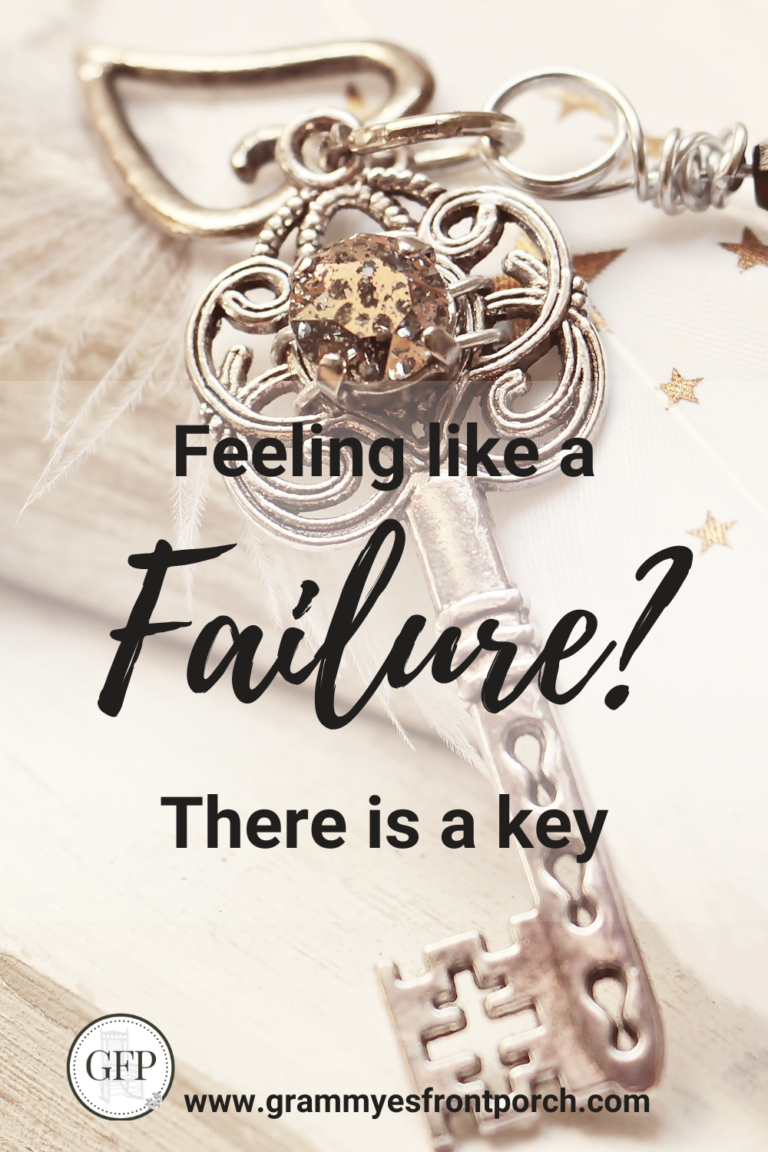8/14/2020
Faintly updated 6/4/22
A confession: I feel like a failure. Sometimes I do. Trying to do the right thing can be elusive. But I know a solution. A remedy. A key. I just need to do it.

Why DO I feel like a failure?
I shouldn’t. I’m getting things done. I’m being nice. Mostly.
And this season, the pandemic, has been such an experience. Like no other.
You know what I mean. You’ve had it too: the confinement, the changes, the uncertainty, the questions.
New rules were imposed on us. Strangers began to tell us what to do. Routines were destroyed. Traditions were sacrificed.
You’ve had to figure out things, and do without things. And you’ve had to find different happiness, right?
Me, too.
But it could have been much worse for my own household. Though our community lost a number of folks, our household did not. We didn’t lose our jobs. We’ve had some really good family time. I’ve completed some projects, and planned toward the future for some others.
Also, I’ve loosened the reins a bit around here. Deciding to stop obsessing over details and pay attention to relationships instead was a good move. It sounds like I’ve got it together.
Maybe you wonder, then, why I have that feeling? You’ll see.
If you’ve been hanging around for a while, you know I’m pretty positive. I’m all about being nice and loving my family and other folks. It’s what I get excited about.
My life experiences have always pointed me to relationships. Always. The good ones, the bad ones, it always comes down to that for me.
That’s my frame for everything. And I always want to do it well. All the times I didn’t (or did) are saved in my head. Lessons learned. Growth opportunities. So I think I’m better at it. And I act like it.
But then…
Then there’s the real me. 😟 The frustration that appears under a little stress, or the impatience that shows when I don’t get my way. So now to compound my frustration and impatience, I’ve got to deal with the embarrassment of not living up to “the me I want to be.”
Do you ever get that feeling like you’re not doing it right? Maybe you’re not keeping up with things, missing deadlines, or forgetting things.
Or worse, seeing you’re missing the mark with conversations and actions? Maybe you hear a little edge in your own voice and realize you sound pretty snarky.
I’m asking because I have that feeling. Not all the time. I have it sometimes.
Really not wanting people to whisper, “What’s up with her?” when I’m out of earshot. But they do.
Are you like me? You want people to come to you with their concerns or their hurt feelings. You don’t really want people to “let it go” and overlook your behavior, but you know they are.
I know it, because it’s familiar. Because I’ve done it before. The thing that causes damage. So I know it’s happening.
A failure is brewing.
Like a tire low on air, or a drawer out of the track, that daily routine is being affected. And it’s me. Something needs to change.
And, as they say, it starts with the person in the mirror.
So What Do People Do About This?
If you’ve done any online searching, you can find a lot of company. Over 500,000,000 searches were made on Google for “Why Do I Feel Like A Failure”. Over half a billion. It must be pretty common, right?
I’m not alone.
I am still trying to imagine that many people struggling.
Over 500,000,000 searches
were made on Google for
“Why Do I Feel Like A Failure”.
Feeling bad about things. I have experience. More than I wish. A well-traveled road for me, climbing out of the ditch repeatedly.
So I’ve compiled my own remedy, a series of adjustments, but it’s only one solution to one aspect of failing. There are many ways to respond to this concern, and I’m not a professional. It’s just that this one addresses the root of the problem. Which I want to tell you about.
Failure.
We’re talking about a very severe idea here. Failure is a strong word.
BUT, there’s good news.
The definition is: a lack of success, or the omission of expected or required action.
Once more:
FAILURE: A lack of success,
or the omission
of expected or required action.
Is that a relief?
That sounds milder than our perception of this word. So, that is good news; we don’t get branded as a failure, and no one writes it on our “permanent record.”
It’s an event, not a person. Good!
It sounds sort of fixable, right? But for some reason, it attaches. And hangs on.
It doesn’t go away easily; it has a tendency to stick to you once you’ve toyed with the idea, like a bad piece of gum on your shoe.
In my case, it’s not truly depression or anything that severe.
It’s simply that I’m not happy with my actions or attitude. That’s where I’m failing.
And a few failures may cause me to define myself by those results.
If I’m not paying attention to details, I forget things. Maybe promises or commitments, maybe I have some relationship issues developing. Maybe I’m not performing at my best at work, or in the groups I’m in. Maybe my projects are not going well. Or I’m not using my time wisely.
These are the failures that are discouraging.
If you feel like your situation is deeper than this, I care. I want a remedy for you, just like I want one for me. But you might find this article lacking.
I Need a Change In The Course
For me, it’s a valid solution. It’s a series of steps I’ve taken before. Believe me when I say they are more easily said than done. I’m going to tell you the four steps, then I’ll tell you a story. A real story about something that really happened. You know why? Because it’s become my touchstone.
Here’s the series of actions that I have decided could bring a remedy:
- Admit what is happening,
- Ascertain the reason,
- Accept the correction,
- Amend the pattern.
So let’s say that “a failure” isn’t me, or anyone else. “A failure” is not a person. It’s an event. Clearly, from the definition above.
A failure is something we do and recover from repeatedly throughout our lives.
Seeing it this way means there’s something we can do. It means it’s a normal part of progress, the learning and adjusting that refines our character.

A failure is something we
do and recover from repeatedly
throughout our lives.
A Real Look at Recovering from a Failure…
Buckle up. This is a quick ride with a lot to see. “4 steps” sounds quick until you really see them. So there’s a lot of truth here that we may have to unpack later.
1. ADMIT
The first one is hard. Admitting. So hard that we often skip over it, just to avoid facing it. But let’s do. Admit that something is going on. If we don’t do this, we’re never going to stop repeating the pattern. This is the first peek in the door, being willing to say that things are “off” and having an open mind about what we will find.
2. ASCERTAIN
Once you’ve done that, you can ascertain the reason. Our natural process is to point our fingers at everyone else and list the causes.
- It’s not our own fault, is it?
- It’s not our omission, is it?
- It can’t be something that gets blamed on me, can it?
Because we just hate to be wrong.
Even if we were’t overtly “wrong”, there’s another possibility: What if we were “righteously wrong?”
We really do have to nail down the actual problem.
What if it’s our response to whatever made us point. It’s our own emotional reaction (or overreaction) to a situation, real or imagined. Our striking out instead of being reasonable. What do we want?
- We want our hurt feelings to be acknowledged.
- We want people to know who’s right and who’s wrong.
- It’s our own idea or action that’s the admirable one, right? Isn’t it?
And how many times now have I said right and wrong? Too many.
Somehow we narrow every incident down to this concept of right and wrong, and we fight to be on top. The winner. The right one.
But What’s Really Going On?
When maybe it’s not even about that.
Not about the contest or the verdict, not about the winner or the loser.
It’s about truth and kindness and relationships. We might not even be aware of the effects of our actions until we’re confronted. Until the truth is before us. (I wasn’t.)
We really need to get to the truth.
And truth isn’t opinion. It’s reality, and a specific reality.
Truth is “being in accord with fact, or fidelity to a standard.”
So it’s an absolute that can be discovered.
We get to the truth either by having it presented by someone, or making a decision to seek it out.
Then we have a choice. Reject it, or accept it. (Enter: courage.)
3. ACCEPT
Confronted — that’s accepting the correction. The loving person who describes the situation face to face. This one is really hard.
I’ve got some stories about this, friends.
Times when the problem had a center, and it was me.
You want to hear one of my awful stories? I’ll tell you in a minute. For now, trust me: Confrontation is awful. But also wonderful. In a way, this is where you find the key.
There is no script for the confrontation conversation. It goes straight to the heart. If admitting there is a problem is difficult, facing the truth about our offenses against someone else is excruciating.


4. AMEND
The final step. You get the key. Then you can start the remedy.
It sounds so easy. Oh, now that we know, just a little adjustment here, a safeguard there, and we’re good, right? Maybe you’ll hear this over the loudspeaker:
“Announcement: The failure has been corrected. We now return to our regular programming.”
Then everyone can dust off and move ahead.
Not exactly.
Once you’ve gone through the painful process of facing your giant, you now have a growth opportunity. Here’s a question:
Will you simply declare an intent to be nicer? To be more diligent or more attentive? To stop whatever it is? Or will you find a deeper solution?
Because…
When my attitude falters, the truth is that a heart issue has crept in.
Either I’ve pursued selfish ambition, or I’m guilty of the secret sin of neglect. (That’s the one no one knows about because it’s what didn’t happen.🤫)
Failures aren’t usually isolated events. They are an outpouring of the contents of the heart.
So today, I’m amending. I’m resuming a discipline that was helpful to me in the past, and I simply let it languish. It is a habit that filled my heart with the attitude protection I needed. It filled my mind with purposeful knowledge, and it directed me more strongly than my circumstances.
My remedy needs to be implemented. What I said earlier, about a heart issue? Sometimes my heart isn’t filled with the good stuff. It’s filled with human emotion.
You know it, don’t you? That’s the thing that will take over your thoughts. Anger, need for pleasure, whatever it is. The thought takes hold, grows, becomes an obsession (or at least a preoccupation). And soon you’re bowing to your own emotions, and they are driving all your words and actions.
There’s a great article from Desiring God (John Piper) about Emotions by Greg Morse.
Reading this article laid bare the problem, something I now cannot ignore.
I’ve got to do something. I’ve got to start. I’ve done it before, and I will do it again. And it will change me. The idea of improving, growing, learning, maturing — it can’t be ignored, or laid aside. It’s a lifelong process of becoming that “me I want to be.”
I need to fill my heart with truth, not my greedy emotions.
It’s time to start.
There is a way to bring Truth into my thinking, correcting the balance in my priorities. And there’s an endless supply of the good stuff. Not only can I read more Scripture, and memorize it, but I can also read books that help me consume it even more deeply.
So I’m doubling down on my spiritual disciplines. I already do a reading plan that completes reading the entire Bible over the course of a year, just a little bit each day. Definitely a good thing. But that’s not enough. It’s not meditation, or memorization, or prayer. And I need to be sure each of these habits are a part of each day.
I’ll resume the worthy practice of Scripture memorization. Because I know I’ve neglected this habit.
Have you ever neglected a discipline you know was good for you? Too tired, too little time, other focus, whatever the reason. We drift away from the things we should be dwelling on.
I have. And greedy emotions have gladly taken their place in my heart.
But I’m taking back the space.
New memory verses. Things to dwell on. I’ll have them on the refrigerator, or on my bulletin board, or at my desk. Maybe on the mirror. I’ll get a fresh filling of the Word of God. And I’ll stop bowing to the gods of emotion, the selfish ambition and vanity, the things that want to be my boss.
Somehow, telling you all this right here makes me more committed.
Here’s my memory Scripture for filling my heart. It’s a printable page with instructions for memorizing the passage.
You were patient, and I promised. My awful story.
A number of years ago I encountered a friend in tears as she went about her work. This was my sweet tender gentle friend. I pressed her for a minute, to see if she would let me help. Someone had hurt her feelings but she didn’t want to say the name.
What drove me to keep asking? My anger: Who would do this to her, this loving, kind person? She didn’t deserve it. It was unthinkable.
She finally shared it after much coaxing. I will never forget the name she said.
Quietly, softly, looking down at the floor through her tears, she said it. “It was you.”
I was the one who hurt her.
When something like that happens, it’s an earthquake in your heart.
I said this above: There is no script for this conversation. It goes straight to the heart. If admitting there is a problem is difficult, facing our offenses against someone else is excruciating.
Without going into the details of the weeks-long story, I’ll just say her accusation was accurate. I had been hurtful toward her more than once. And circumstances had compounded the damage. It was a failure on my part. A heart failure.
Yes, it was painful to face my failure. But what about my friend? What about her pain?
What I Remember:
I remember that I hurt someone. I remember her pain, and I remember her forgiveness.
What happened that day was honest, loving, and healing. She and I were able to complete the conversation right then about my actions and their effects. With her customary quiet grace, she accepted my apology, and we recovered.
I remember every gesture over the next few days. She actually led me through a tender process of forgiveness that remains my most beautiful lesson on this.
I can tell you that our friendship today is stronger and richer, and this story is simply one thread in that tapestry.
Because she had the courage to be truthful, I was able to face the sorrow and humility over my actions that was necessary to begin the repair of our friendship.
Without her honesty, her wound and my offense would have both gone untreated. Because I wasn’t seeking it out.
You see it now: That I got something I didn’t expect. Because it’s hard to start with the person in the mirror. It’s easier to point somewhere else. Because it’s hard to be real.
And yet, being real was the key.
You know what? There was a failure, and it was my fault. It was the omission of an action But there was a way out.
And I’m not a failure.
Neither are you. Because it’s not a person, remember?
You’re living your real life with the people you encounter. And there are failures: things we do by mistake, things we do in haste, and things we fail to do.
The “way out” of those events has everything to do with the outpouring of the heart.
I want to ask you something today.
Not to make you bare your soul to me or anyone else. I’d never do that.
Just to share the questions — the ones I’m asking myself.
How would you describe the outpouring of your heart?
Can you have this kind of honesty in your relationships?
Can you seek the truth?
Can you be the friend who pursues the friendship in that way?
- The one who gently nudges?
- Or the one who feels the nudge?
So you’ve had a very intimate look into my heart. Maybe you wish you hadn’t. Or maybe you’ve got hard stories, too.
I promise not to do that to you often. It’s just that we put that pretty face forward for the world, and not the one that’s made all the mistakes.
Anything you read here is going to be a great truth that someone taught me, whether it’s a recipe or a decor idea or a life truth. For all of that, I am truly grateful.
This is part three in a series of four. You can look back at “When Life Is Overwhelming” or “Why Don’t Things Work Out For Me” to see the first two. And the last will be in September.
Be kind to one another, tenderhearted, forgiving one another, as God in Christ forgave you. Ephesians 4:32
And I wanted to share my intention for renewed Scripture memorization with you. Hop over to my post about Scripture memorization for more about that, and get a free download I hope you will LOVE.
Subscribers, remember that you have access to a free subscriber resource library with all the printables, so that you can download them whenever you like.
Thank you. Thanks for being here. Remember:
- Failure.
- An event, not a person.
- Admit, ascertain, accept, amend.
- Examine greedy emotions.
- Fill our hearts with truth.
- Be kind, tenderhearted, forgiving.
Such were some of you; but you were washed, but you were sanctified, but you were justified in the name of the Lord Jesus Christ and in the Spirit of our God. 1 Corinthians 6:11 — NASB

I’m Grammye, and I’m collecting and sharing ideas that can help you embrace the life you have.
When things are difficult, come here to refresh and relax. We’ll have coffee and talk.

You’re invited
to the neighborhood of GFP.
Accept by signing up
and I’ll send you a letter right away.

Thank you! At GFP company is always welcome!
If you liked this topic 🤗, feel free to 👉 share 👈 on Facebook or Pinterest, or send a link to a friend.
Are you on Pinterest? That is a crazy fun place! You can find so many helpful things. Take a look at what I’ve saved for you! A lot of things that never make it to the blog. Here are my Pinterest pins, and I also have categories/boards if you’re looking for something specific.

Would you like access to the Subscriber Resource Library here at GFP? All the recipes, Scripture printables, etc., are available there, at no cost. Subscribers receive a password to access the library.
-Grammye


